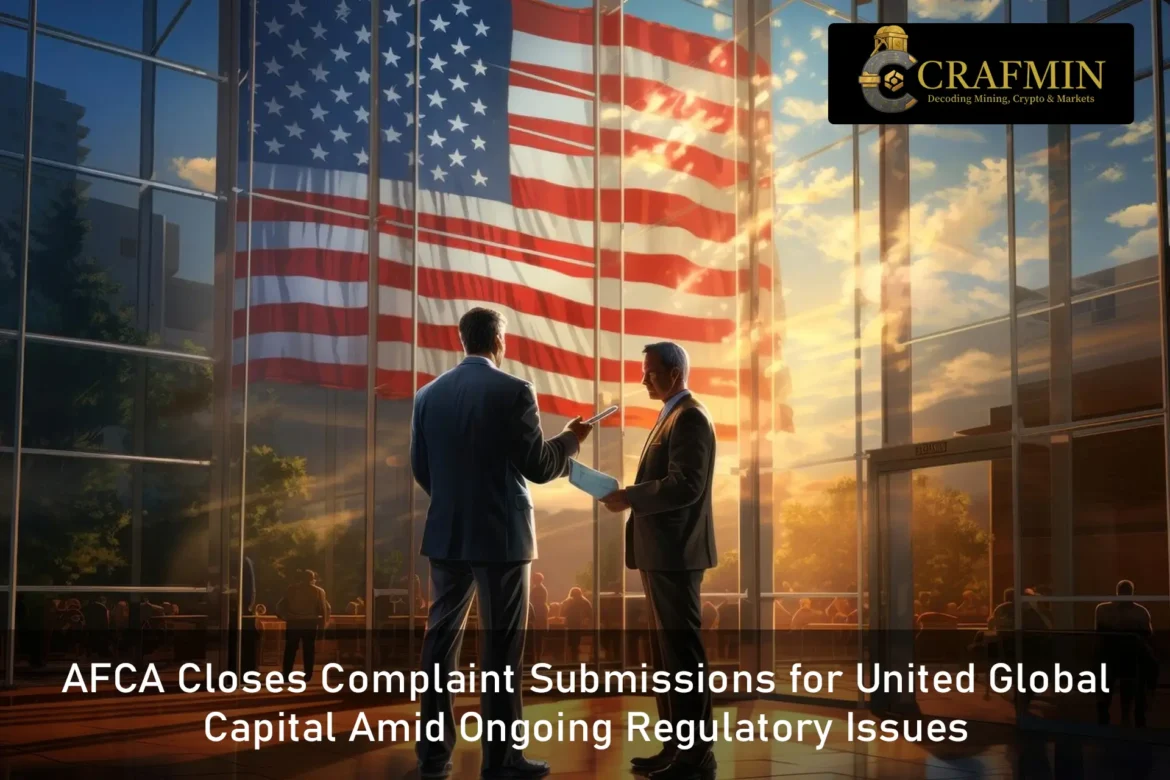The Australian Financial Complaints Authority (AFCA) has officially stopped accepting new complaints against United Global Capital Pty Ltd (UGC), following the firm’s removal from its membership on 31 May 2025 at 5:00 PM AEST. This decision marks a pivotal development in a long-standing case that has raised serious concerns about financial regulation and investor protection in Australia.

AFCA shuts complaint intake for United Global Capital ( Image Source: FX News Group )
What This Means for Investors
AFCA’s cut-off means no new complaints about UGC can be lodged after the deadline. However, if your complaint was submitted before then, it will continue through AFCA’s resolution process, with potential for compensation where appropriate.
Many retail investors impacted by UGC’s advice now face uncertainty, especially those who were encouraged to invest in high-risk financial products without proper disclosure or understanding.
UGC’s Collapse: From Trusted Adviser to Regulatory Target
Once seen as a modern financial advisory firm, UGC’s reputation crumbled after regulatory scrutiny from the Australian Securities and Investments Commission (ASIC). In 2024, ASIC froze UGC’s assets and cancelled its Australian Financial Services (AFS) licence. Director Joel Hewish was also banned from financial services for a decade, with ASIC citing deceptive practices and conflicts of interest.
Also Read: One Nation WA Senate Seat Secured as Tyron Whitten Rides Regional Wave
The Global Capital Property Fund (GCPF) Controversy
Central to the issue was UGC’s promotion of the Global Capital Property Fund (GCPF), a managed investment scheme that raised over $85 million from more than 500 investors. The fund was wound up in late 2024 after the courts questioned its operations. Many investors had unknowingly shifted their retirement savings into GCPF following “free superannuation checks” offered by UGC.

GCPF under fire for investor risk and fund mismanagement ( Image Source: Money Management )
Your Next Steps if You’re Affected
Despite the closure of new complaint submissions, affected investors still have a few potential avenues:
- Ongoing AFCA Complaints
If lodged before the deadline, your case will be reviewed, and a binding outcome may follow. - Compensation Scheme of Last Resort (CSLR)
If UGC cannot pay an AFCA-determined award, the CSLR may provide compensation—subject to eligibility, including that the advice was given while UGC held a valid AFS licence. - Legal Action
Several legal firms are exploring class actions. Seeking professional legal advice could help you explore further options.
A Call for Stronger Regulation
The UGC fallout has reignited debates over regulatory efficiency and consumer protection. Critics argue oversight mechanisms remain reactive rather than preventative. Though AFCA and ASIC have introduced new reforms and transparency tools, more needs to be done to prevent widespread financial harm before it occurs.
Digital Finance and the Challenge of Oversight
This case underscores the complexity of modern financial advice—especially as it extends into areas like crypto, forex, and alternative investments. As more Australians engage with digital finance, the role of dispute resolution bodies must evolve rapidly to keep pace.
The Danger of Misleading Investment Advice
The incident adds to growing concern over unregulated financial advice in high-risk areas like cryptocurrency and foreign exchange. Flashy marketing and limited disclosure have led thousands into risky ventures with little understanding of the true danger—often influenced by advisers with vested interests.
For Financial Services Providers: A Wake-Up Call
The lesson for financial professionals is clear: compliance, transparency, and acting in clients’ best interests are no longer optional. Firms failing to uphold ethical standards face reputational damage, loss of licence, and legal consequences.
How to Protect Yourself from the Next UGC
Here’s a simple checklist for investors to avoid similar traps:
- Confirm AFS Licence: Ensure your adviser is registered with ASIC.
- Understand the Investment: If you can’t explain it, don’t invest in it.
- Check for Conflicts: Ask how your adviser is compensated.
- Use Official Databases: AFCA and ASIC provide free resources to verify provider history.
- Get a Second Opinion: Just like with healthcare, another perspective could protect your money.
Final Word
AFCA’s decision may appear procedural, but for many Australians, it’s a major milestone in their pursuit of justice. More broadly, this case reflects how even sophisticated financial systems can falter—unless regulators, advisers, and investors all commit to accountability, transparency, and early intervention.

